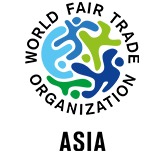The World Fair Trade Organization (WFTO) uses the FINE definition of Fair Trade as follows:
“Fair Trade is a trading partnership, based on dialogue, transparency and respect, that seeks greater equity in international trade. It contributes to sustainable development by offering better trading conditions to, and securing the rights of, marginalized producers and workers – especially in the South. Fair Trade organizations have a clear commitment to Fair Trade as the principal core of their mission. They, backed by consumers, are engaged actively in supporting producers, awareness raising and in campaigning for changes in the rules and practice of conventional international trade.”
All WFTO members comply with the ten principles of Fair Trade. The first principle states:
“Creating Opportunities for Economically Disadvantaged Producers Poverty reduction through trade forms a key part of the organization’s aims. The organization supports marginalized small producers, whether these are independent family businesses, or grouped in associations or co-operatives. It seeks to enable them to move from income insecurity and poverty to economic self-sufficiency and ownership. The organization has a plan of action to carry this out.”
Fair Trade is a not a label, nor is it a piece of paper – it is a movement. It’s a movement of consumers and producers who believe and trust that they can, through their production and consumption, improve some of the injustices of trade. It’s a movement that has been built up over the years by people who feel injustice, and who are motivated to fight for what they believe. But today consumers don’t want reassurance from feelings or motivation – they need research and evidence.
Marginalization is something we in Fair Trade know and work with every day, it’s a given, but was not clearly defined. WFTO-Asia researchers are suggesting the following definition:
“Marginalization describes both a process and a condition that prevents individuals or groups from fully participating in social, economic and political life enjoyed by the wider society.”
WFTO’s new excel tool is used to illustrate the marginalization of the groups that we work with in Fair Trade. It’s not measuring tool – it’s an indicator. To trial the Marginalization Tool, please first complete the contact information request in the bottom right of your screen. Once we receive your information, WFTO-Asia will forward the tool to you within a few business days. Please trial the tool and suggest modifications where necessary so that it can be an essential and effective part of our assessments in the future.
For more information on the Marginalization Tool and WFTO’s efforts to define the marginalized, please read the following:
Defining the Marginalized Assessment Tool Overview
[vfb id=2]
